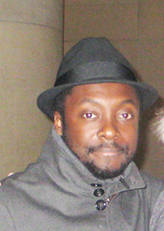
 Will.i.am
Will.i.am
Will likes to see stuff at MIT whenever he is in town. This time I took him to see robots in the Computer Science and Artificial Intelligence Laboratory, wearable computing in the Media Lab, and miscellaneous cool stuff in the Precision Engineering Research Group. It wasn't hard to find people to help out.
We walked around for three hours. Then, he was off to do soundchecks. A few hours after he learned about energy-storing inverse lakes, he and his Black Eyed Peas played to a sold-out crowd at the TD Banknorth Garden.
I always like amazing people, like Will, who is highly creative, does interesting things, and is interested in the future. MIT attracts amazing, highly creative, interesting, interested people like honey attracts bears.
And on top of all that, Will is a fan of my field, Artificial Intelligence. Check out the Peas Imma Be Rocking That Body video.
Anyway, when Will and his entourage were about to leave, and all the obligatory pictures were taken, he asked, as he generally does, if I could use a few tickets for the show. “Hey, that would be great,” I said. I like the Peas, and besides, I hadn't been to a good concert since the Rolling Stones were in town in '06.
Alas, my daughter seized the tickets. “You're nowhere near cool enough to go,” she said, “and I have some friends.” Maybe I should find a new place to buy clothes.
28 February 2010
More pictures of Will.i.am visit.